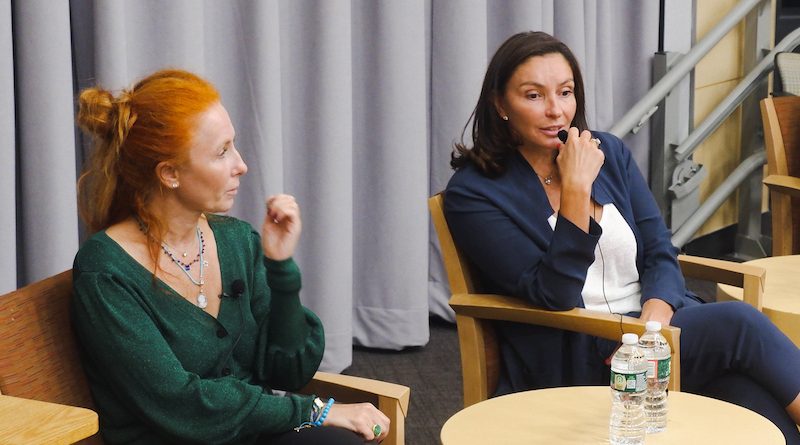Natalya Sindeeva and Vera Krichevskaya Discuss Censorship and Conscription in Russia
By Vishal Manve, MALD 2023 Candidate, The Fletcher School of Law and Diplomacy
Amid the boom and busts of the global financial crisis in 2008, Russian entrepreneur Natalya Sindeeva was intent on starting her own media business centered around optimism in Russia. Sindeeva’s objective was to infuse positivity into everyday conversations around news, politics, the shifting climate in Russia. She founded DozhdTV in 2010, and quickly became the face of the struggle for press freedom amid rising authoritarianism in Russia.
Over a decade later, Sindeeva and her DozhdTV co-founder, Vera Krichevskaya, were stunned when Russian President Vladimir Putin announced partial military mobilization to call up as many as 300,000 reservists on September 21, 2022. However, they proceeded with the scheduled film screening of their 2022 documentary “Tango with Putin,” also known as “F@ck This Job,” at The Fletcher School. The tumultuous developments in the Russian invasion of Ukraine added a momentous dimension to the film screening, organized by the Fletcher Eurasia Club and Tufts Amnesty International. The documentary examines how Russia targeted journalists and the freedom of the press, and eventually created a restrictive ecosystem of disinformation that supported alternate Russo-centric narratives in Eurasian geopolitics.
“We started thinking about this documentary in 2019 as Dozhd was in stagnation, and it was a dark and hopeless time. I felt like this was going to be the end of our Dozhd dream,” Krichevskaya said in a conversation with students and faculty after the movie screening. The conversation was led by Fletcher’s Eurasia Club leader, Alexander Thomas (F23).
Krichevskaya added that both founders were in London in February 2022, welcoming the audience for the screening, when the news about the Russian invasion of Ukraine started hitting the global media landscape.
“We were crying and the tragedy happened right after the film was screened for the audience,” she added.
DozhdTV, owned by Dozhd Media Group, was the last Russian TV station to be openly critical of authorities. Currently based in Latvia, Dozhd broadcasts across Eastern Europe and is popular online through video reports.
Speaking about press freedom, Sindeeva outlined how Russia has zero independent news organizations under Russian President Vladimir Putin’s rule. The state heavily censors the flow of information on social media, news platforms, and elsewhere, thereby shaping and managing public opinion.
Independent journalists were labeled foreign agents by Kremlin in an attempt to thwart their work, resulting in thousands of Russian journalists leaving the country out of fear of persecution and state-sponsored threats.
The TV station is known for its coverage of Russian opposition politics and protest movements, as well as political discussion shows. As illustrated in the movie, Dozhd has faced excessive attention from regulatory authorities, a visit from Russian President Dmitry Medvedev in 2011, and finally suspension on March 1, 2022, the sixth day of the Russian invasion of Ukraine.
“Everything is ruined. Social media is blocked, 5000 media sources are blocked, and 95 percent of independent journalists are outside Russia. They were forced to leave in the first few weeks of the war,” Sindeeva said.
She added how reporting on Russia from neighboring countries is extremely hard, and those working within Russia are often at risk of persecution and imprisonment from authorities. The only political news reporting comes from state broadcasting corporations, occupying the crucial space forcibly vacated by independent journalists.
Despite Dozhd’s innocuous beginnings, the platform ended up personifying David against the state’s Goliath in the battle for information and disinformation.
“Our goal is not only to reach people within Russia but also people outside Russia, and everyone is disconnected. Journalists, along with people, are in a dire situation. Additionally, our role as news media is not just to broadcast information but also to ensure our audience knows they are not alone in these tumultuous times,” Sindeeva reflected.
Through their decade-long journey, Dozhd has reported on the rise of the anti-Kremlin band Pussy Riot; Russia’s gay propaganda law that impacted a large proportion of Dozhd’s staffers; and the struggle between information, propaganda, and disinformation when Russia embarked on a war to annex Crimea in 2014 and the entirety of Ukraine in February 2022.


